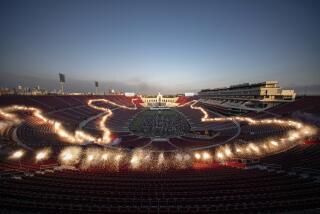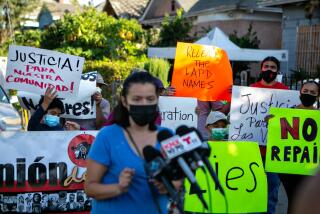Authorities See No Quick Arrest in Atlanta Bomb Case
ATLANTA â Six days after a pipe bomb exploded in Centennial Olympic Park and three days after authorities labeled the âheroâ who allegedly spotted the device a suspect, investigators say an arrest in the case does not appear to be imminent.
âNo one is about to be charged with a crime,â FBI Director Louis J. Freeh said Thursday in Washington. âThere are a number of suspects. The fact that someoneâs name has surfaced doesnât mean anything.â
Amplifying Freehâs comment, a local law enforcement official said that âthere is not a list of suspects, but weâre still following leads. There are leads out there that are taking us everywhere.â
Authorities in Atlanta say Richard Jewell, a 33-year-old security guard, remains a suspect in the bombing that killed one Georgia woman and injured 111 people at a concert early last Saturday. âWe wonât back off until we determine if he is or if he isnât [responsible],â the official said. âThe evidence hasnât been totally analyzed.â
Authorities on Thursday sifted through mounds of material collected during searches of Jewellâs Atlanta apartment and a mountain cabin in northern Georgia where he once lived. Agents also visited several hardware stores near Jewellâs apartment, trying to determine whether he has purchased bomb-making materials.
The naming of Jewell as a suspect sparked a media stampede, with more than 200 journalists camping out in the parking lot of the complex in northeast Atlanta where he shares a two-bedroom apartment with his mother. But making a case against the former deputy sheriff may prove difficult in the absence of forensic evidence.
Indications are that the extensive searches and interviews, a voice-recording of a man believed to be the bomber and videotapes taken from surveillance cameras may not by themselves solidly identify a suspect.
At 12:58 a.m. EDT July 27, eight minutes after Jewell reportedly directed state agents to a knapsack containing the bomb, a man placed a 911 call to the police from a telephone three blocks away. The caller informed a police dispatcher that a bomb would explode in the park in 30 minutes.
Agents have determined that the distance from the park to the telephone may be traveled on foot in eight minutes. But it is unclear whether any of the surveillance cameras in the area captured the image of either the person planting the bomb or placing the call.
Investigators also are analyzing videotapes and photographic film turned in by spectators who may have inadvertently recorded an image of those responsible.
A manager at the Dayâs Inn adjacent to the bank of telephones from which the 911 call was placed said the hotel had turned over all of its video surveillance tapes to the FBI, but added that âtheyâre not going to find very much. The camera angle is bad.â
The call was made to police about 18 minutes before the bomb exploded. A bomb-management team was being notified of the threat when the device went off. No full official explanation has been given as to why it took 10 minutes for the police dispatcher to pass along the information.
Agents of the Georgia Bureau of Investigation said shortly after the blast that while they did begin to evacuate the area, they did not react urgently after Jewell pointed out the knapsack and they had determined that it contained a suspicious device. They said they did not want to create a panic, and assumed the device would turn out to be a fake--like many others that had been discovered in downtown Atlanta during the Olympics.
Apparently no law enforcement official in the park was ever informed of the threat or of the threatened time of detonation.
The partial evacuation has been credited for possibly saving lives. And while Atlanta Police Chief Beverly Harvard maintains that âthe protocol was handled correctly,â it remains unclear whether the area might have been completely evacuated had the bomb-management center been notified immediately.
âThere is a bomb in Centennial Park. You have 30 minutes.â That is all the caller--whom authorities have identified as a âwhite male with no distinguishable accentâ--said. A law enforcement source said a voice analysis is being conducted in an attempt to match the voice with that of a suspect.
Although the validity that courts give such tests is shaky, sound-analysis experts say they have become a common tool used by the FBI when recorded statements about a crime become key evidence, and they often are used to buttress police requests for search warrants.
âThe amplitude of these vocal frequencies would be different over a telephone than in real life,â but the shape of frequencies would not be changed, said John Coleman, a professor of electrical engineering at Georgia Tech University.
According to Alan R. Reich, a University of Washington professor of speech and hearing sciences who regularly testifies as an expert witness in criminal cases, the FBI will typically attempt to compare a taped passage with other passages that have as many words as possible in common.
To make those matches, Reich said, FBI interrogators often channel their questions so that suspects will unwittingly use the same words and phrases that had been used in tapes seized as evidence.
The identification of Jewell as a suspect raises the possibility that the pipe bomb was not a terrorist act intended to take lives. Unnamed law enforcement sources have suggested that the motive might have been to gain fame for identifying the bomb to police.
Jewell made several appearances on broadcast programs in the days after the bombing.
But his apparent interest in pursuing media fame is harder to establish in the hours immediately after the park explosion.
Bryant Steele, a spokesman for AT&T;, which hired the subcontractor that employed Jewell to provide security at the companyâs attraction in the park--said Jewellâs first media contact came from CNN, which had learned through âother sourcesâ that a security guard had played a role in discovering the bomb and herding some concert-goers to safety.
âI canât recall how we got Richardâs name, but it was probably from Anthony Davis Associates [the California security firm that employed Jewell],â Steele said.
In that first interview, conducted the afternoon after the bombing, Jewell appeared âpretty passive,â Steele said. âThe word hero wasnât mentioned until I brought that up. He [Jewell] said, âI donât see myself as a hero.â â
Times staff writer Eric Harrison contributed to this story.
More to Read
Sign up for Essential California
The most important California stories and recommendations in your inbox every morning.
You may occasionally receive promotional content from the Los Angeles Times.











